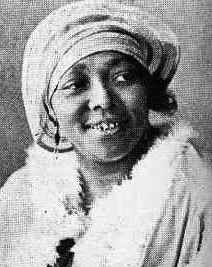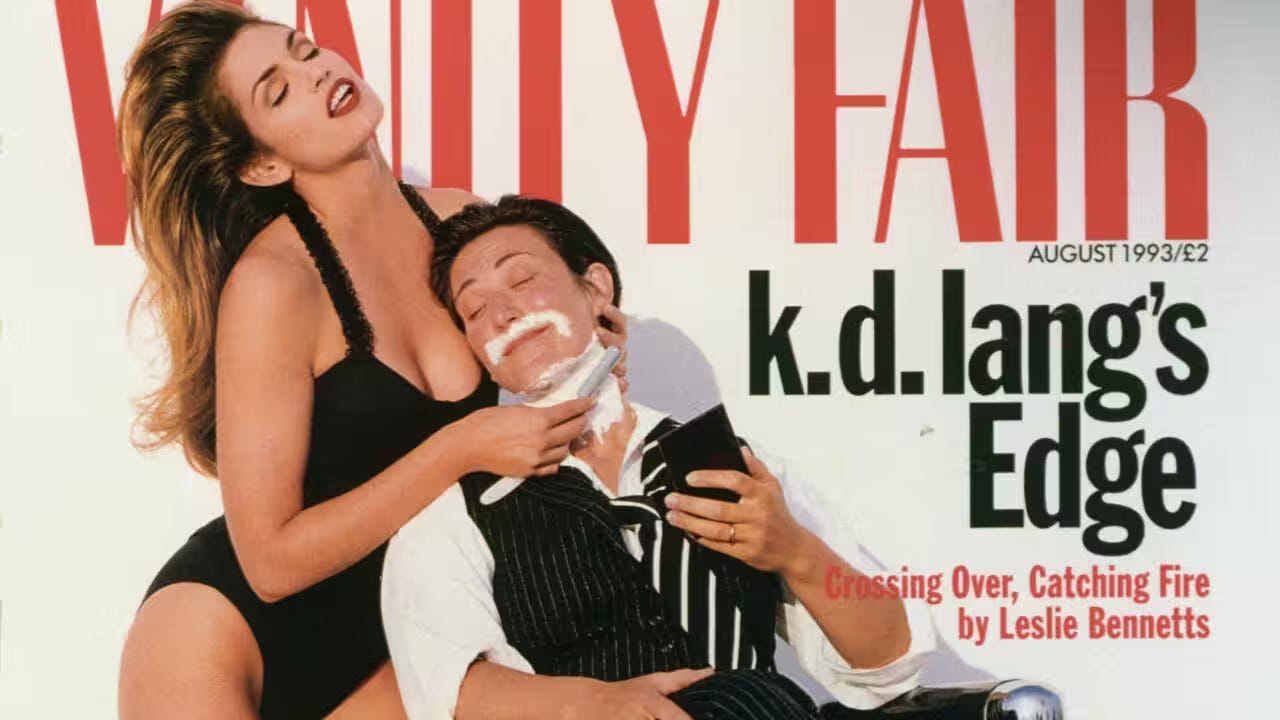One of the first gorgeously tender melodies I remember singing to myself often as a child, and it still creeps through my mind like a soft breeze on a regular basis, accompanied the lyric “my new lady, wherever she goes, has digital clocks and radios”. I never thought about the fact that it was likely Australia’s very first lesbian love song, and indeed one of the first in Western world since the pioneering queer blues singers of the 1920s and 1930s had been firmly pushed back in the shadowy closets. I just loved the doe-eyed string-laden appreciation for this obviously very modern and attractive woman.
Pushing boundaries and blazing trails has been Robyn Archer’s effortless personal oeuvre since the beginning of her career, singing protest songs in coffeehouses since her early teens. ‘Take Your Partners For…The Ladies Choice’ was the name of the 1978 album, produced and written by Robyn (with musical direction by her good friend and musical collaborator, my dad Peter Head!) - yet another first. Out of curiosity, I have long been trying to ascertain the first Australian album written and produced by a woman and I believe it to be this one. Please set me straight if you know otherwise.
Though the 1970s were freewheeling in so many ways, it’s important to remember that women had only gained the right to have their own credit cards just a couple of years before. As well as beautiful ballads, on this album, Robyn also had the more outrageously and subversively themed comedic songs Dicks Don’t Grow On Trees and Menstruation Blues. She later updated her self penned repertoire to sing about The Mmmm (Menopause) Blues long before Menopause The Musical made it ok to even mention its existence. The Backyard Abortion Waltz is another Robyn Archer classic, inspired by a friend of her mother’s who died from a backyard abortion in Adelaide in the 1940s. So many firsts, in song and action, Robyn danced where others feared to tread!
My dad and I went to see Robyn’s fantastic new self devised cabaret show ‘The Australian Songbook’ the other night. The Stage Whispers review stated “She educates as well as entertains and sometimes the message may not sit comfortably. That’s as it should be; Archer encourages us to examine our own values” and ABR hailed how she “convincingly shows how song is the lifeblood of a healthy society, and a mirror to it.”. Not that age should have any bearing on anything, but I can’t help but be impressed that at 75, Robyn is still joyously holding up a sometimes uncomfortable mirror to society while effortlessly entertaining with her spectacularly supple voice and magnetic stage presence, ably supported by her coterie of ‘feminist men’ musicians.
Ma Rainey’s 1928 Prove It On Me Blues is thought to be the first recorded ‘lesbian song’, - cheekily referencing and released soon after police raided a ladies-only party/lesbian orgy Ma attended in Harlem (and was bailed out by non other than Bessie Smith, Empress of the Blues) - proclaiming:
Where she went, I don’t know I meant to follow everywhere she goes Folks say I’m crooked, I don’t know where she took it I want the whole world to know They say I do it, ain’t nobody caught me Sure got to prove it on me Went out last night with a crowd of my friends They must’ve been women, cos I don’t like no men It’s true I wear a collar and a tie Makes the wind blow all the while Don’t you say I do it, ain’t nobody caught me You sure got to prove it on me


In 1935, one of America’s first known singer-songwriters Lucille Bogan (known for her infamous ‘dirty blues’ tunes and for penning songs covered by BB King (Got a sweet little angel, I love the way she spread her wings) among other noted bluesmen) released a progressive ode to ‘bull daggers’ B.D Blues - then the colloquial term for lesbians - (Comin’ a time, B.D. women ain’t gon’ need no men x 2, Oh the way you treat us is a lowdown and dirty sin, B.D. women, you sure can’t understand x 2, They got a head like a sweet angel and lay their jive just like a natural man) under the recording pseudonym Bessie Jackson .
Though other many beloved and progressive blues singers like Bessie Smith, Alberta Hunter and Billie Holiday were known to be gay or bisexual, their lyrics made little reference to it due to the morality of the times and serious legal repercussions of being gay, namely prison.
Lesbian music and artists seemingly disappeared from the face of the earth after the mid 1930s. Of course that is not the truth. 60s popstars Lesley Gore and Dusty Springfield were both gay but kept it private until Dusty shocked the world by casually coming out during an interview with journalist Ray Connolly in 1970.
As two lapsed Catholics, we’d been talking about guilt, mortal sin and going to confession as children.
From there the conversation had led to sex and promiscuity, when Dusty suddenly said: ‘There’s something else you should ask me now. Go on, ask me. I know you’ve heard the rumours.’
She was right. I had heard the gossip that said she preferred girls to boys. So I hesitantly put the question, and she was off.
Never admitting that she was exclusively lesbian, and hating the idea that she might be thought of as a ‘big butch lady’, she happily talked about not being upset that girls ran after her a lot. She was, she said, ‘perfectly as capable of being swayed by a girl as by a boy’.
‘Being a pop singer I shouldn’t even admit that I might think that way, but if the occasion (to swing either way) arose, I don’t see why I shouldn’t,’ she told me.
Connolly knew her revelations would be a big deal, and felt a responsibility to Dusty to make sure it wasn’t reported irresponsibly. He says “after consulting my editor at London’s Evening Standard, where I then worked, I decided to bury the sex discussion in the middle of the article. You had to read the piece to find the candid admissions… Although I later learned that Dusty’s manager had a fit when he saw my interview, Dusty had no regrets. She phoned the day the article was published, and left a message saying she was happy with the way I’d reported our conversation.” She didn’t have another hit until the Pet Shop Boys asked her to collaborate on ‘‘What Have I Done To Deserve This’ in 1987.
Lesley Gore, who sung the hell out of the still resonant feminist anthem You Don’t Own Me at only seventeen years old, before returning to churning out far less subversive like Judy’s Turn To Cry and Sunshine Lollipops and Rainbows. When her parents were sent an anonymous letter outing her, Lesley decided she didn’t care and lived openly as a gay woman from that point.
I love this powerful live version of You Don’t Own Me recorded 25 years later where she has grown into the lyrics and sounds truly fierce.
In 1969, gender diverse singer Maxine Feldman, self identified as a ‘big loud Jewish butch lesbian’ wrote Angry Athis, released in 1971 and considered to be the first openly lesbian song. She describes the lyrics about hating not being able to hold her lover’s hand at the table and all the other ways lesbians were being erased and discriminated against as having just ‘spewed out’ and tells the whole story of the song in a great excerpt from an interview that precedes it. On Wikipedia there’s a story about her performing at the 1977 National Women's Conference in Houston, Texas. Feldman says "There were three hundred KKK in the audience carrying placards that read, 'Kill all dykes, kikes, commies, and abortionists,' and I was three out of four."
In 1973, Cris Williamson, whose first album came out when she was only 16, released the groundbreaking ‘The Changer And The Changed’ on Olivia Records, a hugely successful collective record label she created with other artist partners to "keep profits in the pockets of lesbian artists and sound technicians, and power in the hands of female label heads who would create alternative channels for production and distribution in an industry controlled by men." A true pioneer, her record has become one of the best-selling independent albums of all time. She is still actively performing and recently received a Lifetime Achievement Award from the Americana Music Association.
Though there were many revolutionary, trailblazing LGBTQ+ artists throughout the 70s and 80s, including transgender punk pioneer Jayne County, ‘Queen of Disco’ star Sylvester, Lou Reed and David Bowie, it wasn’t until 1992 that K.D. Lang became the first openly lesbian singer to have a bonafide mainstream hit with Constant Craving, which went on to earn multiple nominations and win Best Pop Vocal Performance by a Female at the 1993 Grammy Awards. She was making a splash on the cover of Vanity Fair getting ‘shaved’ by Cindy Crawford that same year. Melissa Etheridge, Elton John, Janis Ian and Linda Perry were just some of the artists to publicly join her as proud LGBTQ+ icons soon after.
Just two days ago genre defying Grammy winning artist and producer Brandi Carlile, (and #Out100 Icon of the Year), posted on X (Twitter): ‘I will forever be in debt to all the female producers who paved the way for me to do this sacred job’. She also said in Esquire recently: “The thing I like about us queers is I find that our first instinct isn't to be competitive with each other. It's just each other getting in the door and thinking, "This is good for me, this is good for my family, this is good work. How can I get that door open a little further for her or him or they or them?" I come up from this environment of this kind of slumber party mentality—and I remember that because I remember slumber parties being quite traumatic for me—and how like, I have a job right now where people that think like me and people that have a life like mine, that look like me in one way or another, are supporting each other. I'm not trying to be Pollyanna about that shit, but it's pretty cool.”
Happily, nowadays we live surrounded by a beautiful cornucopia of queer love songs and artists and songs that challenge the status quo. But witnessing a legend at work like Robyn Archer made me want to pay my respects to all those that walked, produced, pushed buttons in studios and in society, so we could collectively run and fly today.
I’ll leave you with a few of my favourite modern classic queer love songs to enjoy when you can. Send me your favourites. x
Also read this wonderful profile on Brittany Howard by Amanda Petrusich in the New Yorker.







This along with all your posts is superbly gifted to us Lo .. your work is exemplary and always sO incredibly informative .... thanks so much❣️
Listening to Maxine Feldman as I write. Thank you for sharing your lens. I love it! X